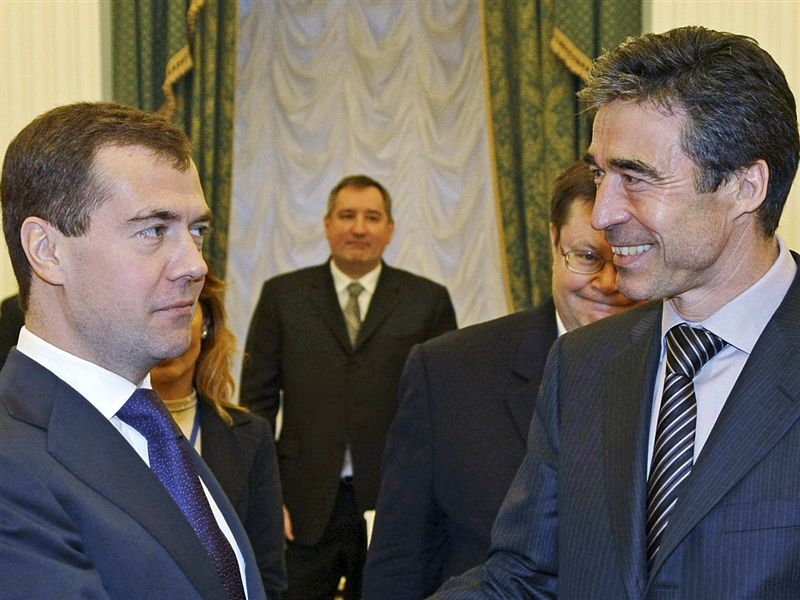
Military Doctrine Consolidates Xenophobia of the Russian Elites
Publication: Eurasia Daily Monitor Volume: 7 Issue: 28
By:

The constitution of the new democratic Russia adopted in 1993 contains a special clause that the nation must have a public military doctrine to mark the end of the time of communist tyranny. A provisional military doctrine was adopted in 1993 and in this document Russia rejected the use of military force to solve international disputes, a notion that is today scorned by the pro-Kremlin press (Izvestiya, February 8).
In 2000, the then President Vladimir Putin signed Russia’s first permanent military doctrine, but in fact the text was prepared during the rule of his predecessor Boris Yeltsin. The 2000 military doctrine was an ambiguous document, created during a time of transition from a shaky democracy to an authoritarian dictatorship. Moscow had already openly clashed with the West over the eastward expansion of NATO and the bombing of Yugoslavia in 1999. The 2000 doctrine singled out as a serious external threat “the expansion of alliances that threaten Russia and its allies,” but it avoided mentioning NATO directly. The military doctrine President Dmitry Medvedev signed into law last week identifies NATO expansion as the prime external threat together with the deployment of foreign soldiers and naval forces close to the territory of Russia and its allies (www.kremlin.ru, February 5).
The Secretary of the Security Council, Nikolai Patrushev, who was in charge of preparing the doctrine, told a press conference in Moscow, “It is a consensus opinion of all who worked on the military doctrine that NATO threatens us and seriously.” Patrushev demanded that NATO must stop “pulling” Ukraine and Georgia into its ranks and “arming Georgia” (RIA Novosti, February 10).
It takes significant bureaucratic effort to reach an inter-departmental consensus to assemble the text of the public military doctrine, and then no one really knows what to do with it next. The new military doctrine, as well as its predecessors is essentially a collection of empty bureaucratic declarations without any mention of means to achieve the stated goals. Similarly, it is a good reflection of the opinions that dominate the political, security and military elite in Moscow.
Last October, Patrushev announced that the new military doctrine would be approved soon and allow the first-use of nuclear weapons, including “preventive nuclear strikes,” to defend against “conventional aggression” not only in possible large-scale, but also in regional and “even local wars” (Izvestiya, October 14). The final text, though markedly anti-Western and anti-American, does not contain anything about “preventive nuclear strikes.” This omission has been interpreted as an important goodwill gesture aimed at the West (Izvestiya, www.russiatoday.com, February 8). The reality might not be so pleasant. Last August, the Deputy Chief of the General Staff, Colonel-General Anatoly Nogovitsyn, who was the head of the defense ministry task force working on the military doctrine told reporters: “The new doctrine unlike the present one will consist of two parts –one public and the other secret.” According to Nogovitsyn, the public part will deal mostly with military-political issues, while the secret one “will specifically depict the plans of usage of the armed forces including nuclear weapons as an instrument of strategic deterrence” (Interfax, August 11, 2009).
The Kremlin announced that Medvedev had authorized the new doctrine and also endorsed another document: “The Principles of the State Policy of Nuclear Deterrence until 2020.” The latter document is absolutely secret; there were no official or unofficial comments about its content. It is quite possible that the “principles” are in fact the more important of the two –the real doctrine that may contain among other things the provisions of possible “preventive nuclear strikes” to defend against “conventional aggression.”
Of course, the leaders of Russia are not suicide bombers eager to bring the world down in a nuclear holocaust –they are pragmatic and corrupt bureaucrats that have assumed unlimited authoritarian power over a nuclear state. In some aspects, the Russian elite have achieved what the rulers of Iran are aspiring to do: securing unlimited power and oil revenue, coupled with a capable nuclear deterrent that guarantees security from external pressure or attack.
NATO’s Secretary-General Anders Fogh Rasmussen did not like the new Russian military doctrine: “I have to say that this new doctrine does not reflect the real world … NATO is not an enemy of Russia.” This statement reflects a common delusion in the West –that the rulers of Russia are still absorbed by old Cold War attitudes. Rasmussen added, “It [the doctrine] does not reflect realities and it is in clear contradiction with all our endeavors to improve the relationship between NATO and Russia” (Reuters, February 6).
In reality, the Russian elite is well connected with reality and its present aggressive xenophobia has little to do with the Cold War when Communist Russia was planning a grandiose strategic operation to defeat “NATO aggression” by sending its tanks to the English Channel and occupying Western Europe. Today, Moscow’s strategic objectives are entirely different –it is resolved to be a regional superpower– the strong man in its neighborhood (as Iran aspires to be in the Middle East). The new doctrine actually contains a clause that Russia is ready to cooperate with NATO –if the Alliance plays ball. The offer is genuine –if the West agrees to strike a deal similar in nature to the one Moscow obtained at the Yalta conference in February 1945, when World War II was nearing its end– to have a free hand in Eastern Europe. Western (NATO) expansion into what the Russian elite sees as its domain is considered as threatening its core vital interests –a casus belli, as demonstrated by the invasion of Georgia in August 2008.
Russia’s rulers are ready to fight, not for some Cold War dream but for their political and physical survival and the new military doctrine shows that, if need be, it includes nuclear weapons.




